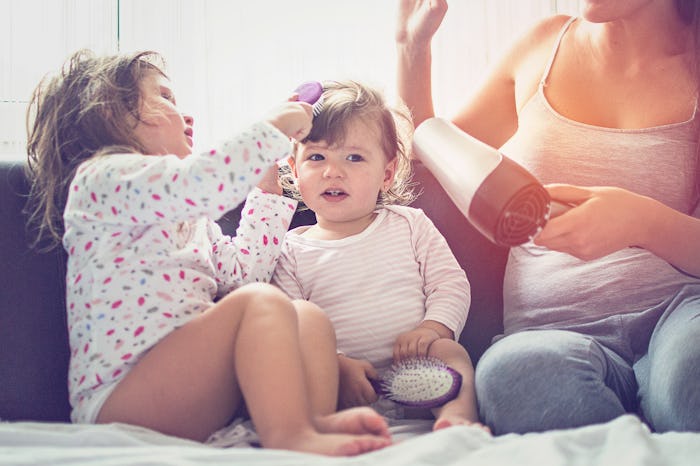Life

Can Coronavirus Live On Hair? Here's What The Experts Say
At this point, you probably have your family's pandemic hygiene routine pretty much figured out, but there are always unknowns. The first thing you do after coming in from a day spent outdoors is to wash everybody's hands, but what about the rest of their bodies? Does coronavirus live on hair? (Or in other words, do you actually need to start shampooing your kid's head on a daily basis?) Like almost everything surrounding this virus, there isn’t a clear-cut answer.
Although person-to-person transmission is the most common way for the virus to spread, COVID-19 can survive on other surfaces, Harvard Medical School Health Publishing reported. It can last up to four hours on copper, 24 hours on cardboard, and (yikes), two to three days on plastic and stainless steel. But what about hair? “COVID-19 can potentially remain viable on various surfaces like hair for a short period of time,” Syra Madad, M.D., an infectious disease expert featured on the Netflix docuseries: Pandemics: How to Prevent an Outbreak, tells Romper. “However, viable does not mean the same as the ability to cause infection, so the likelihood of hair being a means of transmission is low.”
“While droplets can latch onto your hair, you are very unlikely to catch the virus this way,” family doctor Giuseppe Aragona, M.D., agrees. “There needs to be direct contact, from skin to skin, or droplets to skin," he tells Romper.
The reason why hair is a less successful transmitter of the virus has to do with its biological makeup, Dr. Madad explains. “Hair is different than, say, plastic or metal,” she explains. “When it comes to hair, it has natural protective properties so the surface is unlikely to be conducive.” And coronavirus has a half-life, which means that “the viability of the viral particles is significantly reduced,” Dr. Madad adds.
So, is it safe to stick your schnoz into your child’s tousled hair and give it a good sniff every now and then? Probably, but maybe not when they've just come indoors or haven't showered in... a little bit. “It’s a very unlikely source of infection, but we’re in unchartered territory,” warns Dr. Madad. “If you’re keeping a distance from others, as you should be given widespread community transmission, the likelihood of viral contamination on hair should be low in terms of actually causing infection.”
“The particles are more of a problem if they land directly on your face,” says Dr. Aragona. “This is why there is such a need for masks, and for you to not touch your face when you are out in public.” And here's the part you've been waiting for: “I wouldn’t go crazy with washing your hair frequently,” Dr. Madad advises. (Phew.)
You should continue to make sure your family washes their hands frequently, though. “If you happen to stroke your hair, don’t touch your mucous membranes like your eyes, nose, and mouth with dirty or contaminated hands,” says Dr. Madad.
Until there’s a cure (or a vaccine) for COVID-19, there are always baseball caps and ponytails to help during this hair-raising time.
Experts:
Dr. Syra Madad, M.D., infectious disease expert
Dr. Giuseppe Aragona, M.D., general practitioner and family doctor
If you think you’re showing symptoms of coronavirus, which include fever, shortness of breath, and cough, call your doctor before going to get tested. If you’re anxious about the virus’s spread in your community, visit the CDC for up-to-date information and resources, or seek out mental health support. You can find all of Romper’s parents + coronavirus coverage here.